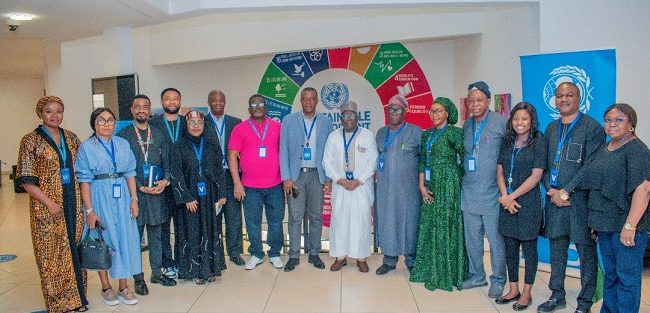The National Council on Climate Change (NCCC) on Friday, April 12, 2024, at the UN House in Abuja signed a Memorandum of Understanding (MoU) with the International Labour Organisation (ILO), the United Nations Industrial Development Organisation (UNIDO), and the United Nations Development Programme (UNDP) to develop a strategic Just Transition Roadmap (JTR) for Nigeria.
The development of a JTR is said to mark a key moment in Nigeria’s efforts to transition to a carbon-neutral future. The signing of the Just Transition Roadmap sets the stage for a project and report that will guide Nigeria’s effort to ensure that climate and energy justice are placed at the centre of the country’s effort to transition away from fossil fuels in accordance with national and global climate goals.
The ILO’s Country Director, represented by Mr Steven Agugua, noted in his opening remarks that the transition to a less carbon-intensive economy is unavoidable because world governments have set net zero emissions targets, which many are working hard to meet. He noted that failure to prepare for the future would not only jeopardise national development but will also leave workers and some vulnerable sectors stranded.
He noted that finding ways to make the transition just and equitable is the ILO’s primary strategic goal. He said this goal has informed ILO’s effort to develop a just transition framework for Nigeria, which is a fossil fuel-dependent economy. The JTR, he said, is an important step towards achieving the ILO’s goal of assisting vulnerable sectors and workers in the transition to a decarbonised future.
Responding, the Director General (DG) of the NCCC, Dr Salisu Dahiru, acknowledged that Nigeria is in a tricky situation concerning climate change and the global energy transition. The DG said Nigeria’s unique challenge lies in the fact that one hand, the country is very vulnerable to climate change, and the other hand, highly depended on oil and gas as national source of income. He said that this unique situation calls for the need to find ways to make the transition to a sustainable energy future fair to all.
This, he said, necessitates a thorough understanding of the risks to various sectors and articulating thoughtful paths to achieve the transition in ways that do not endanger Nigeria’s long-term prosperity. He said it is to this end that the Commission initiated the JTR with the international organisations to ensure that the country articulates ways to ensure that green transition is fair and equitable without leaving Nigeria behind.
The DG expressed confidence that the Centre for Climate Change and Development at Alex Ekwueme Federal University (CCCD-AEFUNAI), which will be leading the development of the JTR, will do a good job of providing pathways for Nigeria based on national economic and sociotechnical circumstances.
Continuing, the DG said that Nigeria has no choice but to participate in the global decarbonisation efforts. However, he noted that the government has a duty to participate in ways that secure its long-term strategic interests. He said the Federal Government, in collaboration with its international partners, recognises the importance of supporting workers, women, and people with disabilities who are likely to face greater risks because of the goal of phasing out fossil fuels.
He expressed confidence that CCCD-AEFUNAI, led by Professor Chukwumerije Okereke, a renowned climate policy scholar, has the team to deliver the just transition roadmap.
In response, Professor Emmanuel Oladipo, a renowned scholar and Professorial Fellow at CCCD-AEFUNAI who led the team for the MoU signing event, expressed gratitude to the NCCC and other international partners for the chance to establish a just transition. He said that establishing the framework is a crucial national endeavour in the shift to a future with reduced carbon emissions.
He pledged that the CCCD team would provide a roadmap that the country could use to plan strategies for lowering the carbon intensity of their economic activities in ways that supports the sectors and populations that are vulnerable to the transition. He concluded that the just transition roadmap is an opportunity to build back better and lay sound principles of equity in all transitions that leave no one behind.
Some of the other dignitaries that were presents in the MoU signing ceremony include: Team Lead, Environment and Energy, UNDP Nigeria, Muyiwa Odele; the UN Resident and Humanitarian Coordinator, Mr. Mohammed Mallick Fall; and National Programme Coordinator, Environment and Energy, UNIDO, Oluyomi Banjo.
Others include Head of the Directorate of Energy, Infrastructure and Transportation, NCCC, Michael Ivenso; Just Transition Roadmap Project Coordinator, NCCC, Jummai Vandu; Senior Research Fellow, CCCD-AEFUNAI in charge of climate finance; Mr Obi Ugochukwu; and Senior Research Fellow in charge of industry and political economy, Dr Sadiq Okoh.
By Dr Austine Sadiq Okoh, Senior Research Fellow at CCCD-AEFUNAI






